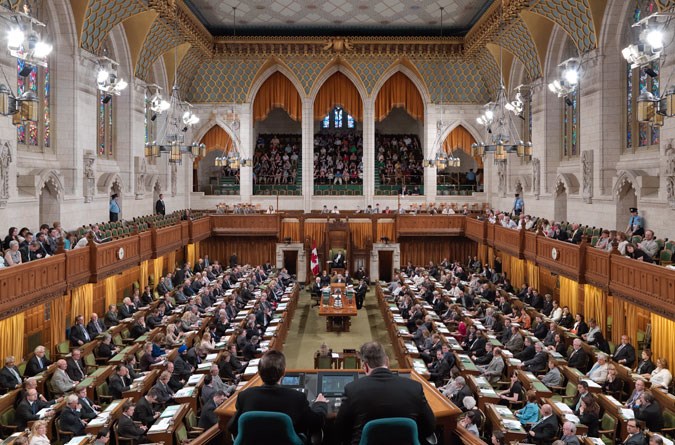With the polls indicating an "all but certain" minority government in the offing on Monday night, Canadians are about to get a crash course in civics and parliamentary democracy.
That's the message from UBC political scientist David Moscrop on the eve of Canada's 42nd federal general election.
According to the polls at North Shore News' deadline Friday, the Liberals stand the greatest chance of capturing the most seats in parliament, but even if that turns out to be true, it won't automatically make Justin Trudeau the prime minister under our system of government.
"There's going to be a lot of claims that the party that wins the most seats should be the government. It's not true," he said.
Regardless of the seat count, Stephen Harper will remain the prime minister and will have the first opportunity to form government, although, that's pretty unlikely to last if the Conservatives don't hold the most seats, Moscrop said.
"I think it's unlikely they'll survive. It is almost certain they'll be defeated and defeated quickly," he said.
From there, it will be for the parties to work out amongst themselves who can command the confidence of Parliament and name a prime minister. "It might take a bit of time. There might be a bit of uncertainty," Moscrop said.
The ensuing power struggle will undoubtedly provoke a robust public debate about what is democratic and what is legitimate, Moscrop said, although in his experience, most Canadians don't understand the finer points of a Westminster-style democracy such as ours.
"People know very little about it and a lot of what people think they know is incorrect," he said. "In Canada, we don't elect the government or the cabinet or the party or the prime minister. We elected a Parliament of MPs who then work out amongst themselves who they want to run the country."
The party in the strongest position to form a government will have to enter into a formal coalition, or, more likely, an ad-hoc agreement with one of the other parties to support them on budget bills and other votes of confidence in Parliament, which must pass in order for the government to survive.
"It (would) look a lot like 2004 did under the (Paul) Martin minority. The NDP would have significant input into the throne speech, into the budget, into the whole parliamentary agenda and they would agree to support the Liberals," Moscrop said.
In the event that the Conservatives win the most seats but not a majority, they'll probably have a tougher time getting the support of the Liberals and/or NDP. Without enough votes to pass a budget, Harper could stay in power by delaying the sitting of Parliament until as late as June 2016.
"There will be pressure on the prime minister to make his intentions clear and to call Parliament fairly quickly although in theory, he could wait," Moscrop said. The last time that happened was under Progressive Conservative Joe Clark's minority government in 1979 and it didn't turn out well for Clark, whose government fell shortly after Parliament began sitting. "That sent us to a general election and Pierre Trudeau came in and just crushed the Conservatives and took a majority, largely because people were upset with Clark for dithering for so long," Moscrop said. "I think that if (Harper) ends up in a minority, he's done. The other parties won't support him and if he waits too long to call Parliament, the public is going to lose it. He'll lose all credibility and he risks tanking the Conservatives for a decade. Nobody wants to be the prime minister who generated a constitutional crisis."
And no matter who is prime minister when the hurlyburly's done, don't expect their government to last long, Moscrop added.
"A couple of years would be a pretty good haul for a minority government. This one will probably be particularly volatile. I don't think it's out of the realm of possibility that we're doing this all again in the spring or summer," he said. "God help us all."



